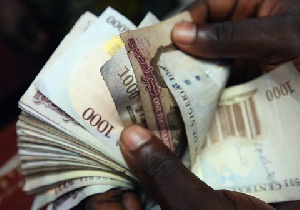Africa News of Thursday, 21 May 2020
Source: allafrica.com
Nigerians experience income drop after lockdown - Report
A recent survey carried out by FinMark Trust through the i2i initiative, in partnership with EFInA, reveals that some Nigerian households are beginning to experience reduced income, lower food consumption, and reduced access to financial and health services following the onset of the COVID-19 epidemic and related lockdowns.
The survey, conducted via mobile phones, was commissioned to generate more complete and inclusive data on how the COVID-19 pandemic is impacting lives of Nigerians.
The survey is nationally representative of the Nigerian adult population of over 18 years, as more than 1,800 adults were surveyed between April 8 and 16 via telephone. Similar surveys were also carried out in Kenya and South Africa.
Beyond the direct impact of COVID-19 on those infected, there is an indirect effect on global health supply chains. 14 percent of adult Nigerians report the inability to access medicine in the week prior to April 8, mainly due to lack of funds and unavailability of medicines.
45 percent report some form of an increase in the price of medicines. The majority of Nigerian adults are adopting recommended health behaviour changes following the onset of the pandemic, such as increased washing of hands, staying at home, limiting contact with other people, avoiding group functions, and using hand sanitizers. However, 32 percent say it is not very likely and 11 per cent say it is not at all likely that they would seek medical care if they had mild symptoms such as cough or fever.
The area of socio-economic effect, findings from the report showed that nearly half of the adults report that income earned in the week prior to April 8 was smaller than the amount earned same time last year.
However, the EFInA Access to Financial Services in Nigeria 2018 survey found that approximately 50 million adult Nigerians earn their income either daily or weekly, and movement restrictions have likely reduced income earning opportunities for some Nigerians.
According to the EFInA 2018 survey, "The reported rapid increase in COVID-19 cases in Kano state is a warning that we cannot afford a spread of the pandemic in the North. If in Lagos state where 1 in 5 adults live below the poverty line, the popular refrain is that 'Poverty will kill us before coronavirus', one can only imagine what will be the case in Kano state where at least 4 in 5 adults live below the poverty line. As the poor get more desperate for food and essentials, the result is a threat to the security of lives and property. 44 per cent of adults already report an increase in crime in the 14 days prior to April 8, and 25 per cent of adults are extremely worried about their personal safety and that of their family members."
Jeoffreys-Leach, S. et.al, 2020 report had also explained that 64 per cent of farmers report difficulty in selling crops or livestock. This signifies a threat to food security with the possibility of further hikes in food prices. With disruptions in supply chains, not only will available food not get to the markets, farmers may also not have enough capital for the next planting season if they cannot sell profitably this season. The report further said that nearly half of Nigerian adults report at least one day in the week prior to April 8 in which a household member ate fewer meals because there was not enough food. According to the report, the picture appeared less bleak in Kenya while South African adults report no incidence of decline in meals.
Over the years, EFInA has worked with stakeholders in the financial sector to increase access to financial services as a pathway to improved livelihoods. With the widespread use of mobile phones in Nigeria, 85 percent of adult Nigerians either own or have access to a mobile phone - digital financial services provide an opportunity to extend affordable, reliable solutions to Nigerian adults who are financially excluded. The impact of the COVID-19 pandemic further highlights the need to urgently expand digital financial services in Nigeria.











